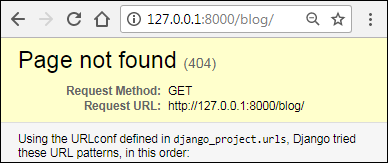Redirecting URLs in Django
Last updated on July 27, 2020
Redirecting using HttpResponseRedirect #
HttpResponseRedirect is a subclass of HttpResponse. As its name says, instead of returning a normal response, it redirects the user to a different URL using a temporary redirect (i.e HTTP 302 status code). It accepts a string path to redirect to. To use HttpResponseRedirect you have to import it from django.http module.
from django.http import HttpResponseRedirect
Before we any demonstrate how to use HttpResponseRedirect visit http://127.0.0.1:8000/blog/, you should see a 404 page as follows:

This happens because the /blog/ URL is not mapped to any view function.
Now open urls.py in the blog app and add the following URL pattern at the beginning of urlpatterns list.
TGDB/django_project/blog/urls.py
1 2 3 4 5 | #...
urlpatterns = [
url(r'^blog/$', views.test_redirect, name='test_redirect'),
#...
]
|
In view.py, add test_redirect() view function at the end of the file.
TGDB/django_project/blog/views.py
1 2 3 4 5 | from django.http import HttpResponse, HttpResponseNotFound, Http404, HttpResponseRedirect
#...
def test_redirect(request):
return HttpResponseRedirect("/")
|
Visit http://127.0.0.1:8000/blog/ and HttpResponseRedirect will redirect you to http://127.0.0.1:8000/. We can also specify any external URL like http://example.com/, in that case visiting http://127.0.0.1:8000/blog/ will redirect the user to http://example.com/.
1 2 | def test_redirect(request):
return HttpResponseRedirect("http://example.com/")
|
Instead of manually typing the URLs, we can also use reverse() method with HttpResponseRedirect to automatically create urls. For example:
TGDB/django_project/blog/views.py
1 2 3 4 5 6 | #...
from django.shortcuts import render, get_object_or_404, get_list_or_404, reverse
#...
def test_redirect(request):
return HttpResponseRedirect(reverse('post_list'))
|
Redirecting using HttpResponsePermanentRedirect #
Django provides another method called HttpResponsePermanentRedirect which works exactly like HttpResponseRedirect but performs a permanent redirect (i.e HTTP 301 redirect). To use this class first import it from django.http module.
from django.http import HttpResponsePermanentRedirect
Open views.py file and amend test_redirect() to use HttpResponsePermanentRedirect as follows:
TGDB/django_project/blog/views.py
1 2 3 4 5 6 | from django.http import (HttpResponse, HttpResponseNotFound, Http404,
HttpResponseRedirect, HttpResponsePermanentRedirect)
#...
def test_redirect(request):
return HttpResponsePermanentRedirect(reverse('post_list'))
|
Visit http://127.0.0.1:8000/blog/ again, this time you will be redirected to http://127.0.0.1:8000/ using a permanent redirect (i.e HTTP 301 redirect).
The redirect() shortcut #
The redirect() is shortcut function to redirect the users to different URLs. It accepts URL path or name of the URL pattern to redirect to. To use it first import it from django.shortcuts module.
from django.shortcuts import redirect
Open views.py and amend test_redirect() view to use redirect() instead of
HttpResponsePermanentRedirect.
TGDB/django_project/blog/views.py
1 2 3 4 5 6 7 | #...
from django.shortcuts import render, get_object_or_404, get_list_or_404, redirect
#...
def test_redirect(request):
return redirect('post_list')
|
By default redirect() performs a temporary redirect i.e HTTP 302 redirect, to do a permanent redirect pass permanent=True.
1 2 | def test_redirect(request):
return redirect('post_list', permanent=True)
|
Things become a little more interesting when you find out, you can also pass a Model object like, Post or Category to the redirect() function. If Model class has defined get_absolute_url() method then redirect() method will redirect the user to the URL returned by the get_absolute_url() method.
Open views.py again and modify test_redirect() view as follows:
TGDB/django_project/blog/views.py
1 2 3 4 5 | #...
def test_redirect(request):
c = Category.objects.get(name='python')
return redirect(c)
|
Visit http://127.0.0.1:8000/blog/ and test_redirect() method will redirect you to http://127.0.0.1:8000/category/python/.
Trying to pass a Model object to redirect() without defining get_absolute_url() in the Model class will cause TypeError exception to be thrown (or 500 Internal Server Error in production).
Note: To checkout this version of the repository type git checkout 19a.
Load Comments